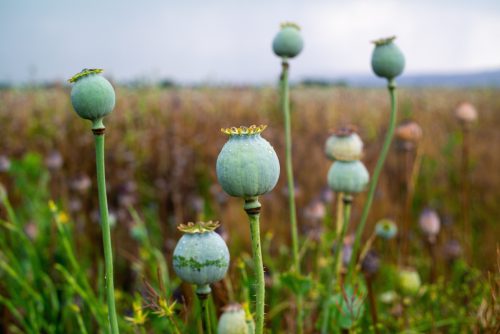23rd June 2022
Taliban's poppy ban leads to concerns of an imminent synthethic opioid crisis in the UK - but what's the solution?
Over the last few weeks, the Government’s Home Affairs Select Committee has held evidence hearings as part of its inquiry into drugs. The interdisciplinary panellists have included police and crime commissioners, chief constables, lawyers, medical professionals, academics, and various representatives from civil society (including Transform) - the vast majority of whom unanimously agree that the UK’s current drug policy is failing.
In a recent oral evidence session on the 18th of May, concerns were raised regarding the Taliban’s pledge to ban poppy cultivation in Afghanistan. If this pledge materialises, it could trigger a significant drought in pure heroin, leading to concerns that synthetic opioids such as fentanyl and its analogues would fill the gap, contaminating the UK’s heroin market. As Professor David Nutt highlighted, one such analogue, carfentanil, is “a thousand times more potent than heroin” presenting a grave threat to unassuming users, putting them at risk of overdose. This displacement of the heroin supply by fentanyl analogues has seen devastating consequences in the US and Canada, with opioid overdose now the leading cause of accidental death in the US. Moreover, the risk is not limited to the heroin supply. The US’s Drug Enforcement Administration recently identified 180 samples of fentanyl-laced cocaine in Florida, posing a risk beyond heroin consumption.
Presented with these emergent challenges created under prohibition, the question is not whether we should reform drug policy, but how? Internationally we have seen various responses to the fatal crisis. In some cases, communities have seen grassroots efforts to mitigate harm. Darknet marketplaces, for example, have been at the forefront of community-led harm reduction offering lab testing verification models and transparent product reviews. For those who can’t access these marketplaces, the Drug User Liberation Front in Canada uses the darknet to purchase wholesale unadulterated heroin, cocaine and crystal meth and distribute it for free in Vancouver with in-house testing and labelling.
While these efforts have been a necessary immediate response, they can be precarious and unsustainable. In the UK, where we find ourselves in a situation in which the safety of people who use drugs relies on the behest of the Taliban, something has surely gone terribly wrong. However, with the right infrastructure, we have an opportunity to tackle this inevitable wave of synthetic opioids. Here are several measures the UK Government can implement to save lives, improve health, and reduce crime:
Drug Safety Checking – While drugs remain unregulated under current legislation, drug testing is an essential harm reduction intervention to reduce associated harms. Identifying purity, potency and potential adulterants can be a life-saving practice. The organisation The Loop has pioneered drug testing in the UK, starting at festivals but also piloting city centre on-site testing, with a recent Home Office license granted to operate in Bristol. But more work must be done to bring these vital services to the inner cities at the street level.
You can read our briefing on drug safety checking.Overdose Prevention Centres (OPC) – OPCs are designated spaces for safer sterile drug consumption. They provide clean equipment, supervision by a trained medical professional, and access to wraparound support including healthcare, counselling and housing. Almost 200 operate across the world, with the first one opening in Switzerland more than 30 years ago., The results are compelling: in New York 300 overdoses have been reversed in its OPC’s first six months of operation. OPCs not only prevent overdose, but reduce the risk of HIV and Hepatitis infection, street-related crime, public injecting, and discarded needles. To date, no one has ever died from an overdose in an OPC.
You can read our briefing on OPCs.Heroin Assisted Treatment (HAT) – HAT involves prescribing diamorphine (medical-grade heroin) to patients as part of a treatment programme, typically to those individuals who have not had success with other forms of treatment Prescribing reduces the risk of accidental overdose and consumption of synthetic opioids, while starving the illegal heroin market of customers. Evidence from Switzerland showed that just 10% of the heaviest heroin users consumed 50% of all the illegal heroin imported. This suggests that providing HAT to the top 10% of the heaviest, long-term users would substantially decrease the demand for illegal heroin. When heroin is obtained legally by prescription, it also reduces associated crime, namely acquisitive crime to fund drug use, and, most importantly, restores dignity to the lives of people who use drugs.
You can read our briefing on HAT.Legal regulation – The solutions above, while effective and necessary, merely treat the problem rather than cure it. If we want to get serious about saving lives, improving health, and reducing crime, then we must confront the failings of the drug war and consider a future beyond prohibition. Through regulation of production and supply of drugs, the Government will take back control of the drug market and remove it from the hands of organised crime.
You can read our blueprint for legal regulation.
Following the Home Affairs Select Committee’s evidence, experts across the board - from scientists to police chiefs - are calling for a move away from a punitive, criminal justice approach, towards one of public health. The Taliban’s pledge to ban poppy cultivation is just the latest chapter in the ailments associated with prohibition. The Government must act now to truly get drugs under control through the measures listed above, to avoid the devastating fate of an emergent opioid crisis.
If you would like to get involved in the fight against prohibition, join our annual lobby of Parliament on the 28th of June.
This blog is written by George E. Smith




